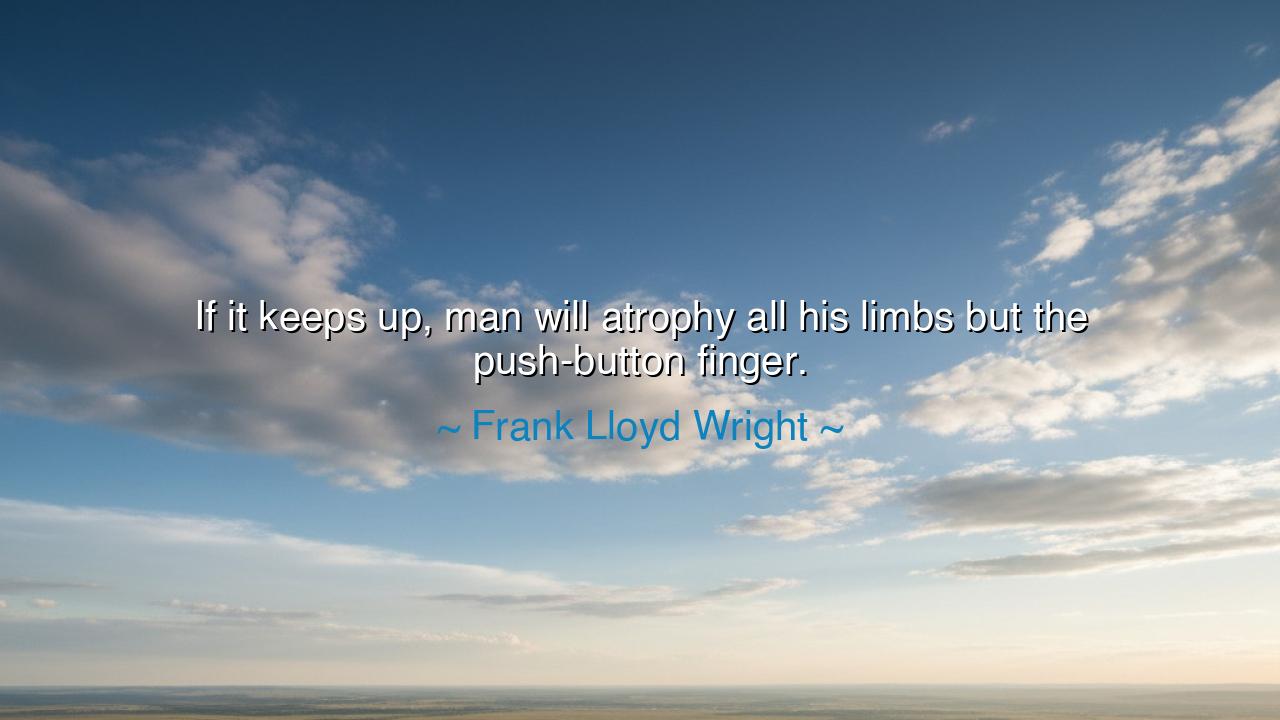
If it keeps up, man will atrophy all his limbs but the






When Frank Lloyd Wright, the master architect of organic design, declared, “If it keeps up, man will atrophy all his limbs but the push-button finger,” he spoke as a prophet warning of the spiritual dangers hidden within mechanical ease. His words are not mere jest, but lament and caution: that in surrendering too deeply to technology, humanity risks losing its strength, its creativity, and even its very vitality. The hand that once carved, built, planted, and wrote may become reduced to a single finger, pressing a button, while the rest of the body and soul grow weak.
The meaning of his words lies in the balance between effort and dependence. Wright saw that machines, once intended to serve, can become crutches that weaken. The more humanity gives over to automation, the less it must move, strive, or labor. And in the absence of labor, the limbs that once shaped the world fall into atrophy. Thus the warning: ease may comfort the body, but it can starve the spirit. For growth comes not from pressing buttons, but from the discipline of action, the rhythm of sweat, and the courage to create with one’s own strength.
History offers vivid examples. Consider the decline of mighty Rome. Its early citizens were hardened by toil, conquering fields and building roads with their hands. But in later centuries, as wealth poured in and slaves filled the workshops, Roman citizens abandoned labor for luxury. They grew soft while others worked in their stead. Bread and circuses replaced sweat and craft, and soon the empire was too fragile to endure the storms that came. Rome did not fall from lack of power, but from the atrophy of its people’s strength. Wright’s words echo this fate: when effort is abandoned, weakness follows.
Another mirror lies in our modern age. The rise of automation has brought wonders—factories humming, cars driving, devices answering with a single touch. Yet with these marvels comes a cost. Children play less in fields, hands grow clumsy without craft, and bodies weaken with inactivity. Minds too may dull, relying on machines to remember, calculate, and even create. Thus the warning of Wright: when man places all his will into a push-button, he risks becoming not master but slave of his own inventions.
Yet his words are not only warning—they are a call to courage. Wright, who believed in harmony between man and nature, urges us to use technology as servant, not as master. Machines should aid us, but never rob us of the joy of creation, of the dignity of labor, of the strength born from challenge. To retain our vitality, we must still build with our hands, think with our minds, and strive with our bodies. The push-button may serve us, but it must not define us.
O seekers of wisdom, let this lesson be engraved upon your hearts: do not surrender your limbs to atrophy. Even in a world of automation, choose to create, to move, to grow. Plant gardens, craft with your hands, write with your own words, think without the aid of machines. In doing so, you preserve not only your body, but your soul. For man was not made to press buttons alone, but to shape the world with strength and imagination.
Therefore, remember Wright’s saying: “If it keeps up, man will atrophy all his limbs but the push-button finger.” It is a prophecy, but it need not be fulfilled. Let it serve as a guiding flame: embrace technology, but never abandon effort. Keep your hands strong, your mind alive, your body in motion. For only in striving, not in mere ease, will humanity remain whole, creative, and free.






AAdministratorAdministrator
Welcome, honored guests. Please leave a comment, we will respond soon